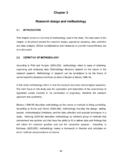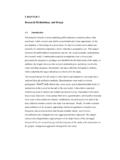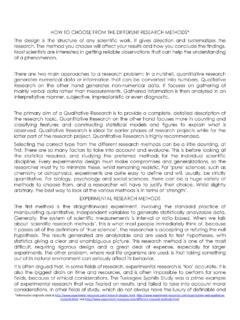Transcription of This work is licensed under a Creative Commons Attribution ...
1 Copyright 2008, The Johns Hopkins University and Katherine Fritz. All rights reserved. Use of these materials permitted only in accordance with license rights granted. Materials provided AS IS ; no representations or warranties provided. User assumes all responsibility for use, and all liability related thereto, and must independently review all materials for accuracy and efficacy. May contain materials owned by others. User is responsible for obtaining permissions for use from third parties as work is licensed under a Creative Commons Attribution -NonCommercial-ShareAlike License. Your use of this material constitutes acceptance of that license and the conditions of use of materials on this Issues in Ethical Issues in Qualitative ResearchQualitative ResearchKatherine Fritz, , MPHK atherine Fritz, , MPHJ ohns Hopkins School of Public Health, Department of Johns Hopkins School of Public Health, Department of International HealthInternational HealthOverviewOverview Ethical principles guiding public health research Ethical principles guiding public health research are built on a foundation of medical ethics, are built on a foundation of medical ethics.
2 Developed in the first instance to regulate the developed in the first instance to regulate the conduct of clinical of clinical research . The application of medical research ethics to The application of medical research ethics to qualitative research can be awkward at research can be awkward at times. We will practice how to apply ethical principles We will practice how to apply ethical principles to a range of qualitative research a range of qualitative research MethodsQualitative Methods ObservationObservation StructuredStructured ParticipantParticipant InIn--depth interviewsdepth interviews Focus Group DiscussionsFocus Group DiscussionsOverarching Ethical PrinciplesOverarching Ethical PrinciplesAll researchers are responsible for ensuring that All researchers are responsible for ensuring that participantsparticipants Are wellAre well--informed about the purpose of the informed about the purpose of the research they are being asked to participate
3 Inresearch they are being asked to participate in Understand the risks they may face as a result of Understand the risks they may face as a result of being part of the researchbeing part of the research Understand the benefits that might accrue to Understand the benefits that might accrue to them as a result of participatingthem as a result of participating Feel free to make an independent decision Feel free to make an independent decision without fear of negative consequenceswithout fear of negative consequencesIssues in Qualitative ResearchIssues in Qualitative research Protection of participants through the informed Protection of participants through the informed consent process favors formalized interaction consent process favors formalized interaction between researcher and researcher and participant.
4 Strength of qualitative research methods often Strength of qualitative research methods often lies in the informality of the communication as lies in the informality of the communication as well as the iterative nature of the research well as the iterative nature of the research How can we reconcile these two conflicting How can we reconcile these two conflicting dynamics?dynamics?Structured ObservationStructured Observation You are interested in documenting patterns of social activity atYou are interested in documenting patterns of social activity atdifferent types of bars in preparation for developing an different types of bars in preparation for developing an intervention to reduce sexual risk taking associated with drinkiintervention to reduce sexual risk taking associated with drinking.
5 Ng. You propose to do an inventory of all legal bars in a given You propose to do an inventory of all legal bars in a given neighborhood and start visiting them. You will visit bars at neighborhood and start visiting them. You will visit bars at different hours of the day and record your observations (how different hours of the day and record your observations (how many people are there, whether there are sex workers present, many people are there, whether there are sex workers present, what people are drinking, general observations of the what people are drinking, general observations of the environment). You record these observations on a form and plan environment).
6 You record these observations on a form and plan to eventually use these data in your eventually use these data in your publication. Who are the research participants?Who are the research participants? What are the risks?What are the risks? How will you minimize the risks?How will you minimize the risks? Who needs to provide informed consent?Who needs to provide informed consent? As an IRB member, what are your main concerns?As an IRB member, what are your main concerns?Participant ObservationParticipant Observation You go to the bar and have a drink! You make friends You go to the bar and have a drink! You make friends with bar patrons and start hanging out there on a with bar patrons and start hanging out there on a regular basis.
7 You talk informally to bar patrons about regular basis. You talk informally to bar patrons about their drinking patterns and sexual lives. You take field their drinking patterns and sexual lives. You take field notes about these conversations and include details notes about these conversations and include details about these individuals (without identifying them). You about these individuals (without identifying them). You plan to use these data in your to use these data in your publication. Who are the study participants? What are your obligations to Who are the study participants? What are your obligations to offer an informed consent process to them?offer an informed consent process to them?
8 What information would you provide? When?What information would you provide? When? What are the risks to participants?What are the risks to participants? How would you minimize the risks?How would you minimize the risks? As an IRB member, what are your concerns?As an IRB member, what are your concerns?GuidanceGuidance The obligation to inform people that they are part of a The obligation to inform people that they are part of a research project is universal, no matter what your research project is universal, no matter what your methods!methods! Always be honest about who you are, what your Always be honest about who you are, what your research is about, why you want to talk, and what you research is about, why you want to talk, and what you will do with the do with the information.
9 Depending on your methods, written informed consent Depending on your methods, written informed consent may not always be necessary and may, in fact, negatively may not always be necessary and may, in fact, negatively impact the quality of your research . Always consult the impact the quality of your research . Always consult the IRB for guidance and work with them to come to IRB for guidance and work with them to come to mutually agreeable solutions to protect the participants mutually agreeable solutions to protect the participants as well as the integrity of your research well as the integrity of your research Establish clear procedures that reduce risk and Establish clear procedures that reduce risk and maximize confidentiality (GQP):maximize confidentiality (GQP): Ensure your field notes and transcripts do not contain Ensure your field notes and transcripts do not contain personal identifiers.
10 Personal identifiers. Keep raw and processed data locked and/or password Keep raw and processed data locked and/or password protectedprotected Share data only with those who are part of the study team Share data only with those who are part of the study team (investigators) and who have received research ethics training(investigators) and who have received research ethics training If you are supervising a team to collect data, conduct If you are supervising a team to collect data, conduct thorough ethics training of ethics training of EVERYONE. Establish clear chain of custody procedures to ensure data is Establish clear chain of custody procedures to ensure data is not diverted or diverted or lost.



















